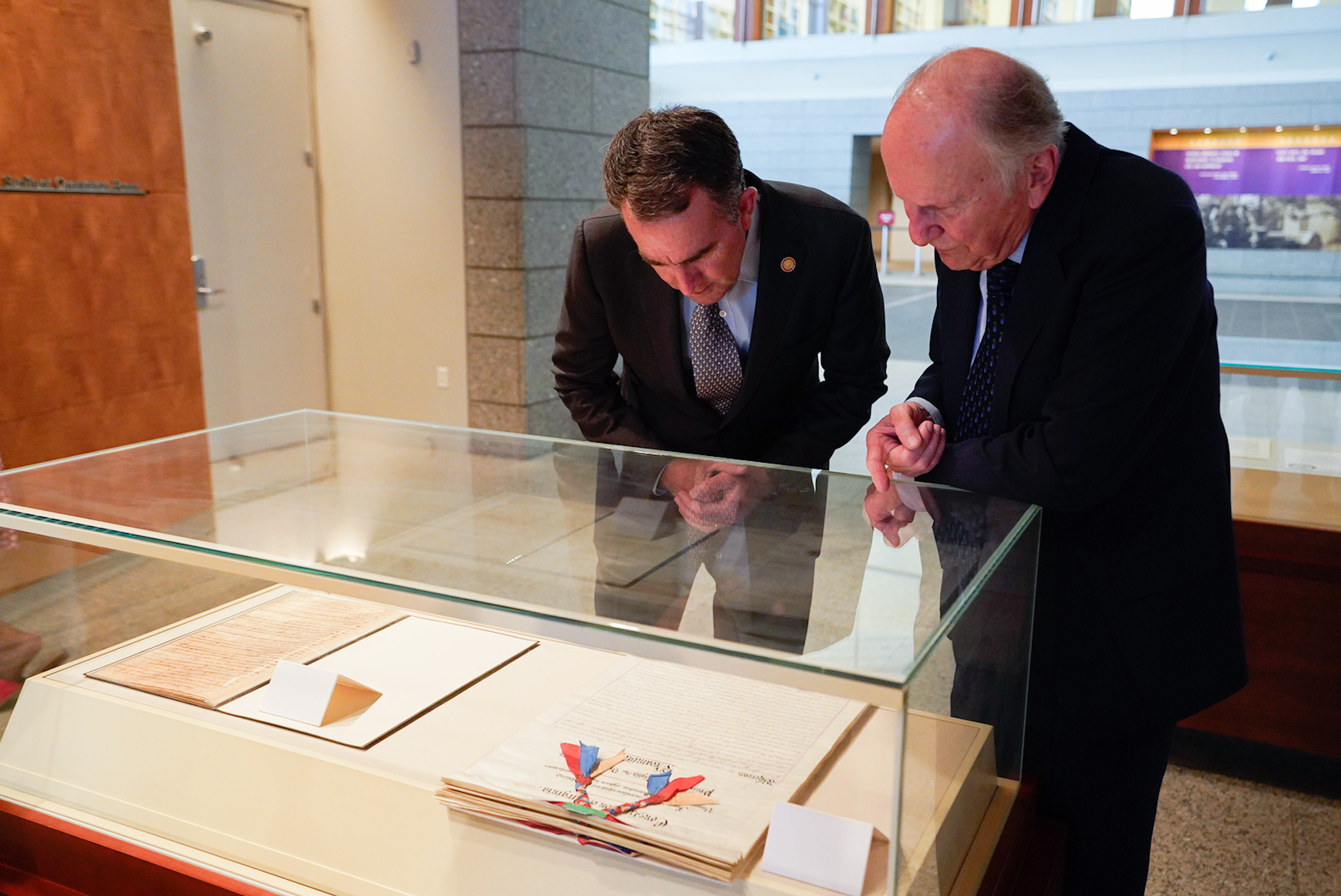by Gregory S. Schneider
RICHMOND — A.E. Dick Howard was a confident young college professor, only 34, when he got the assignment of a lifetime: Oversee the writing of a new constitution for Virginia. Hope was hard to come by that year — 1968 — with cities in upheaval over the assassinations of the Rev. Martin Luther King Jr. and Robert F. Kennedy. But Howard's task amounted to a stroke against the darkest forces of society. The document he helped create repudiated a Virginia constitution adopted in 1902 with the stated purpose of disenfranchising Black people, which it did with bureaucratic efficiency for decades. The new constitution went into effect on July 1, 1971, finally bringing the modern era to the state where American slavery originated.
Read Moreby University of Richmond
The existing constitution, dating from 1902, was tainted by a drive to enshrine white supremacy. It used such devices as the poll tax and complicated registration procedures to disenfranchise the vast majority of black voters. Its drafters accomplished their aim with grim efficiency. The 1902 constitution was also long and cumbersome. Many of its provisions belonged in the statute books. Lastly, by 1968, when the commission got underway, court decisions and national legislation required change. In Brown v. Board of Education, the Supreme Court held in 1954 that racial segregation in public schools was unconstitutional. In 1966, the court struck down the poll tax. Congress enacted the Voting Rights Act of 1965. All in all, Virginia simply could not continue with the 1902 constitution.
Read Moreby Mason Adams
The latest Virginia Constitution went into effect 50 years ago this month, but in today's world of polarized politics, it feels like it might as well have been 1787. Virginia's first constitution was passed in 1776, the year the United States declared independence. The state's present constitution is the seventh incarnation of the commonwealth's governing document.

The penultimate state constitution was written in 1902 and entrenched Jim Crow laws that disenfranchised Black people and other non-white citizens, including by restricting voting rights through measures such as poll taxes and literacy tests designed to skirt the U.S. Constitution's 15th Amendment.
Read Moreby University of Virgina
"I believe that constitutions are shaped by context–by history, tradition, culture, and politics," explains A.E. Dick Howard, Warner-Booker Distinguished Professor of International Law at the University of Virginia's School of Law. Howard's January Term, or J-Term, course gave students the chance to study constitutionalism “through the lens of a distinctive place."
Read MoreGovernor's Office
RICHMOND—Governor Ralph Northam today marked Constitution Day by visiting the Library of Virginia to view original copies of four of Virginia's Constitutions and commemorate 50 years since the current Virginia Constitution took effect on July 1, 1971. Until 1971, the Virginia Constitution included detailed provisions intended to disenfranchise Black voters and prohibit racially integrated public schools.

In the years after the Civil War, the brief period of Reconstruction was characterized by state and federal laws that expanded the rights and freedoms of citizens. But Virginia leaders re-wrote the state constitution explicitly to restore white supremacy, culminating in the Constitution of 1902 that instituted poll taxes, literacy tests, and other barriers to voting.
The Constitution also required segregated schools by prohibiting the teaching of Black and white children in the same school. While some of the most discriminatory provisions of the 1902 Constitution were reversed by federal law or court decisions, it remained in effect in Virginia for most of the 20th century, until voters approved a new constitution in 1971.
Read Moreby Jordan G. Sisco
July 2021 marks the 50th anniversary of Virginia's 1971 constitutional revision. Since that time, the commonwealth has changed dramatically, even as the principles upon which the Constitution rests were established centuries ago in 1776. Among the most fundamental of these principles is expressed in George Mason's Virginia Declaration of Rights, now enshrined in Article I, Section 6 of Virginia's Constitution. That section provides: “all men, having sufficient evidence of permanent common interest with, and attachment to, the community have the right of suffrage.”
Read Moreby Ben Paviour

Virginia's 1971 Constitution moved the commonwealth out of the era of Jim Crow and Massive Resistance. Fifty years after it went into effect on July 1, the constitution faces new and old challenges: the persistence of inequities of past eras, distrust in government, and the survival of democracy itself. Still, the legal scholar who oversaw the process believes their work has held up well. "I think the process today -- if you tried to do the same thing -- would be messy, would be divisive, contentious," said Dick Howard, a University of Virginia law professor who served as the executive director of the commission that drafted the constitution. “It's a good thing that we wrote the present constitution when we did." Former Gov. Mills Godwin, at the time a Democrat, picked a commission in 1968. By then it was clear that the state constitution, most of which was drafted in 1902, needed an overhaul.
Read Moreby Library of Virginia

The magazine of the Library of Virginia. Our quarterly magazine describes and illustrates the holdings and happenings at the Library of Virginia.
Read Moreby NBC12 Newsroom
RICHMOND, Va. (WWBT) - Virginia's current constitution, the seventh in the commonwealth's history, is turning 50 years old on July 1, and the Library of Virginia has planned several events to celebrate the anniversary. The current version became effective on July 1, 1971, according to the Library of Virginia, and advanced the commonwealth in areas such as civil rights, local government, education and environmental conservation. The previous version had been enacted in 1902.
Read Moreby UVA School of Law

Law Special Collections recently installed Revising the Virginia Constitution, 1968-1971 in the lobby of the Law Library. In honor of the fiftieth anniversary of the 1971 Virginia Constitution, the exhibit provides a retrospective look at Virginia's Commission on Constitutional Revision through the work of UVA Law professor and constitutional law expert A. E. Dick Howard ('61).
Read Moreby Bold Domination
For Episode 43 ("Where did Virginia's state constitution come from?"), producer Katherine Hansen talked at length with UVA Law professor A.E. Dick Howard, who wrote the current Virginia constitution. For the full civics experience, we're offering that full interview here as a bonus episode this week.
Read More